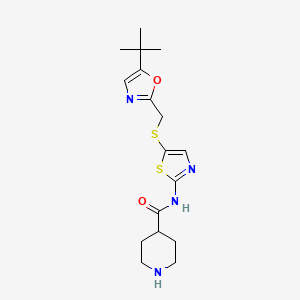m6A-centered Drug Response Information
General Information of the Drug (ID: M6APDG03334)
| Name |
SNS-032
|
||||
|---|---|---|---|---|---|
| Synonyms |
BMS-387032; BMS-387072; BMS-387032, SNS-032; N-[5-[[[5-(1,1-Dimethylethyl)-2-oxazolyl]methyl]thio]-2-thiazolyl]-4-piperidinecarboxamide L-tartaric acid salt (2:1); N-(5-(((5-(1,1-Dimethylethyl)-2-oxazolyl)methyl)thio)-2-thiazolyl)-4-piperidinecarboxamide; N-[5-[(5-tert-butyl-1,3-oxazol-2-yl)methylsulfanyl]-1,3-thiazol-2-yl]piperidine-4-carboxamide
Click to Show/Hide
|
||||
| Status |
Phase 1
|
||||
| Structure |
 |
||||
| Formula |
C17H24N4O2S2
|
||||
| InChI |
1S/C17H24N4O2S2/c1-17(2,3)12-8-19-13(23-12)10-24-14-9-20-16(25-14)21-15(22)11-4-6-18-7-5-11/h8-9,11,18H,4-7,10H2,1-3H3,(H,20,21,22)
|
||||
| InChIKey |
OUSFTKFNBAZUKL-UHFFFAOYSA-N
|
||||
| PubChem CID | |||||
| TTD Drug ID | |||||
| VARIDT Drug ID | |||||
Target Gene(s) and Their Upstream m6A Regulator, Together with the Effect of Target Gene(s) in Drug Response
The target genes involved in drug-target interaction (such as drug-metabolizing enzymes, drug transporters and therapeutic targets) and drug-mediated cell death signaling (including modulating DNA damage and repair capacity, escaping from drug-induced apoptosis, autophagy, cellular metabolic reprogramming, oncogenic bypass signaling, cell microenvironment, cell stemness, etc.) could be regulated by m6A regulator(s) and affected their corresponding drug response. You can browse detailed information on drug-related target gene(s) mediated by m6A regulators.
Cyclin-dependent kinase 2 (CDK2)
Fat mass and obesity-associated protein (FTO)
| In total 1 mechanisms lead to this potential drug response | ||||
| Response Summary | Cyclin-dependent kinase 2 (CDK2) is a therapeutic target for SNS-032. The Fat mass and obesity-associated protein (FTO) has potential in affecting the response of SNS-032 through regulating the expression of Cyclin-dependent kinase 2 (CDK2). | [1], [2] | ||
YTH domain-containing family protein 1 (YTHDF1)
| In total 1 mechanisms lead to this potential drug response | ||||
| Response Summary | Cyclin-dependent kinase 2 (CDK2) is a therapeutic target for SNS-032. The YTH domain-containing family protein 1 (YTHDF1) has potential in affecting the response of SNS-032 through regulating the expression of Cyclin-dependent kinase 2 (CDK2). | [2], [3] | ||
YTH domain-containing family protein 2 (YTHDF2)
| In total 1 mechanisms lead to this potential drug response | ||||
| Response Summary | Cyclin-dependent kinase 2 (CDK2) is a therapeutic target for SNS-032. The YTH domain-containing family protein 2 (YTHDF2) has potential in affecting the response of SNS-032 through regulating the expression of Cyclin-dependent kinase 2 (CDK2). | [1], [2] | ||
P-glycoprotein 1 (ABCB1)
Insulin-like growth factor 2 mRNA-binding protein 3 (IGF2BP3)
| In total 1 mechanisms lead to this potential drug response | ||||
| Response Summary | P-glycoprotein 1 (ABCB1) is a therapeutic target for SNS-032. The Insulin-like growth factor 2 mRNA-binding protein 3 (IGF2BP3) has potential in affecting the response of SNS-032 through regulating the expression of P-glycoprotein 1 (ABCB1). | [4], [5] | ||
Methyltransferase-like 3 (METTL3)
| In total 1 mechanisms lead to this potential drug response | ||||
| Response Summary | P-glycoprotein 1 (ABCB1) is a therapeutic target for SNS-032. The Methyltransferase-like 3 (METTL3) has potential in affecting the response of SNS-032 through regulating the expression of P-glycoprotein 1 (ABCB1). | [5], [6] | ||
References